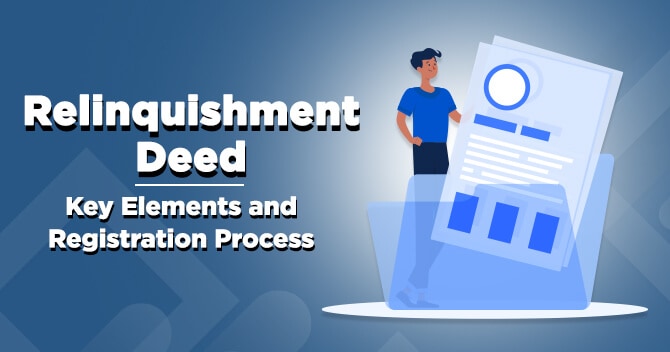
When transferring property rights to a nominee, a relinquishment deed is required. When a person dies intestate, that is, without leaving a testament or will, it is required. The property should be inherited in order to be relinquished. Only another legal heir, such as relatives, children, or family members, can inherit it. When dealing in relinquishment deeds, it is best to use a qualified lawyer to ensure that the deed is not contested on any grounds.
The registration procedure takes place at the sub-registrar office of the area in which the property is located. To register the deed, you must pay a specified amount for both the registration cost as well as stamp duty. All state and union territory has its own set of fees, and even the registration fee differs from state to state.
Relinquishment Deed Format: What Does It Mean ?
A relinquishment deed is referred to as a legal document in which the owner of property releases or transfers his or her legal interest in the property to some other person. In this case, the owner relinquishes his or her legal right to the property to another individual. Because it is a legal document, the relinquishment deed must be carefully executed and registered in line with all applicable laws and regulations.
For the appropriate execution of a relinquishment deed and compliances, you’ll need a skilled property lawyer as well as a consultant. After creating a relinquishment deed, the proper documents are required to register the deed.
When Do You Create A Relinquishment Deed ?
When a property owner dies without leaving a will and the legal heir of the property desires to give up their legal rights to a co-sharer or co-owner, a relinquishment document is required. It’s worth noting that a relinquishment deed cannot ever be registered in the name of any of the third parties. The person in the name of whom the deed is getting done has to have some share in that property. Because it is just the inheritor who can transfer that property.
Who Can Make The Relinquishment Deed ?
A person with a share in the inherited property can produce a relinquishment deed. In other words, a property co-sharer might abandon their entitlement to the property in favor of another property co-sharer. This will include the individual’s mother, father, children, sister, as well as a brother. The property can never be relinquished in the name of any third person.
Registration Of A Relinquishment Deed: Why Is It Necessary?
A relinquishment deed must always be recorded in order for the property rights to be legally transferred. Section 17 (1) b of the Registration Act of 1908 governs this. This act is used to verify the transfer of an immovable property right to the other co-owner. This makes the process of property transfer legal. Hence it is very important that you register the relinquishment deed for safety in the future.
The Sample Of Relinquishment Deed Format: How Is It ?
This is the sample of a relinquishment deed, you may go through this to get a fair idea.
Relinquishment Deed
The deed for relinquishment is being executed and made on this ___day of ________ by
________________, ______ of Late (relationship) _________________ and _________________,
____________ of Late ___________________, residents of _________________________________
_________________________________________________________, hereinafter known as the
Releasors/Executants
In the favour of
________________, _______ of Late (relationship) ___________________ hereinafter known as the
Releasee.
Whereas Late ________________, was the subscriber according to the National Pension System with the
PRAN ________________.
Whereas the mentioned Late ____________ expired intestate as well as without nominating any person for receiving
the claim to withdraw the accumulated pension amount, which leaves behind the following legal
heirs:-
Sr no. / Names /Ages/ the Relationship / Addresses
1.
2.
3.
Important Elements Of The Relinquishment Deed

- Legal document: The relinquishment deed is a legally binding document. An heir can transfer or release his legal entitlement to the inherited property using this legal paperwork.
- Consequences: Such a transfer of the rights results in the release of one co-share owner and the expansion of the shares of the other co-owners.
- Irrevocable: Even if made without deliberation, a release or relinquishment deed can be irrevocable. The property must be owned by more than one individual in order for the relinquishment to be valid.
- Relinquishment can’t be done in the favor of any 3rd person: The Relinquishment of a property cannot be done in favor of the individual other than the co-owner. If at all the relinquishment is being made in favor of a person and he is not the co-owner, then the transaction can be recognized as a gift.
- Must be present in writing: In the case of immovable property, relinquishment of rights must be done solely through the written instrument known as the relinquishment deed, which must be acknowledged by each and every party and verified by 2 or more different witnesses.
- Must always be registered: The relinquishment deed is governed by Section 17 of the Registration Act of 1908, and as a result, a release of immovable property rights must be recorded. The registration of the deed occurs at the sub-office of the registrars in the jurisdiction where the property is located.
- Consideration: Both with and without any kind of consideration, the relinquishment deed can be executed.
- Easy process: A relinquishment deed could be prepared and recorded in a matter of days at a low cost.
Relinquishment Deed: The Process Of Registration

First, a draught of a relinquishment deed is created on Rs. 100 stamp paper. Make sure you don’t miss any details or misspell anything. Make an effort to use plain wording so that the deed is easy to understand by all persons who are involved. The deed would be filed with the sub-registrar office in the county where the property is located.
To register the deed, all of the parties who are involved must be physically present. They must also prepare all the necessary papers ahead of time before paying the registration price. The relinquishment deed could be obtained in around a week prior to the verification of the documents by the officials.
What Happens When A Relinquishment Deed Is Unregistered?
Unregistered relinquishment deeds are not legally binding and cannot be challenged in court. Any kind of transaction which involves any form of immovable property is only legitimate if the deed is properly executed and is registered by paying the stamp duty and registration fees.
Section 17 (1) b of the Registration Act requires that every document that will have the impact of creating or removing a right in regard to any intangible assets be registered, and section 49 of this Act prohibits unregistered documents from being admitted and is dealing with the following documents that are needed to be registered according to the section 17 of the act.
How Can You Challenge The Relinquishment Deed?
The grounds for canceling a relinquishment deed is also similar to those for withdrawing a contract (with the exception that there really is no value or money involved in this deed), and they are as follows:
- Misrepresentation,
- Fraud,
- Coercion,
- Undue influence,
Any kind of similar grounds
As a result, the deed may only be withdrawn if there really is the absence of free consent; it cannot be withdrawn for any other reason, according to the whims and preferences.
Second, both of the parties, that is, the person who resigned the property and even the individual in whose favor it had been relinquished, must agree to the cancellation. However, if the benefits person refuses to revoke the deed, you can file a civil court petition to have the deed canceled.
The limitation period in which you can challenge: The Limitation Act specifies a three-year limitation period for filing a challenge. (Begins on the day that the right is infringed upon.)
What Are The Differences Between The Gift Deed And The Relinquishment Deed?
Whenever an inherited land is being ceded, the relinquishment deed is used. The legal rights towards the property are being ceded, or given up, in this circumstance. In addition, the nominee must be the co-owner of that property.
Compensation may be necessary for specific instances. The property in the event of a gift deed, but on the other hand, it does not have to be an inherited property. The property is being gifted from one person to another, as the name implies. The recipient of a gift deed can be anyone. A gift deed does not necessitate payment.
Can The Relinquishment Deed Be Challenged Or Revoked?
Deeds of relinquishment are rarely revoked. The co-owner might, however, withdraw it in extreme circumstances. The situations include deception of a co-owner, the use of force to reach an agreement, and the person’s misinterpretation of a document. If the other co-owner refuses to agree to the cancelation of the deed, the case is taken to civil court. The relinquishment deed could also be canceled just within the initial three years prior to the registration of that deed.
Relinquishment Deed: Final Thoughts
A relinquishment deed must always be registered since an unregistered deed is not deemed legitimate. When it comes to legal issues and documentation, you must exercise extreme caution. For being on the safer side, hire a professional whenever possible. To avoid any errors or inaccuracies in the registration process, an expert lawyer and advisor should be recruited while preparing a relinquishment deed.
We hope this article will help you get all the information and questions that you had regarding the relinquishment deed.
Relinquishment Deed FAQs:
1. Why is a relinquishment deed used and is important ?
The relinquishment deed is typically used for legalizing this act of transferring the inherited property, that is from a co-sharer to some other co-sharer of that property.
2. What do you require for the relinquishment deed?
Only the inherited property can be relinquished through a deed of relinquishment. The executor and nominee should both be co-owners of the property. In addition, the persons involved must be physically present in order to register a deed. Prior to the registration process, all the legal paperwork should be completed.
3. What happens when a person can’t be present physically for the registration of a deed ?
When a party to a relinquishment deed is unable to attend in person, such as when they are suffering from a terminal illness or a handicap, they must file a written application to the sub-registrar office. The Officials would pay the individual a personal visit to finish the registration process.
4. Why is registering a relinquishment deed so important ?
A relinquishment deed must always be registered since an unregistered deed is not deemed to be legitimate. It makes the process of relinquishing one’s claim to the inherited property legitimate.
5. How is a release deed different from a relinquishment deed ?
A relinquishment deed is a legal instrument that oversees the transfer of legal property rights from one co-owner to the next. It can be made with or without the participation of the people involved. A release deed, on the other hand, requires both parties to agree to the relinquishment of rights. And occasionally, these two terms are often used interchangeably.
6. How can I challenge the relinquishment deed ?
A co-sharer might contest for a relinquishment deed on some specific basis, such as if there was any kind of scam or compelled to provide their assent, or if the individual’s final document was misinterpreted.






